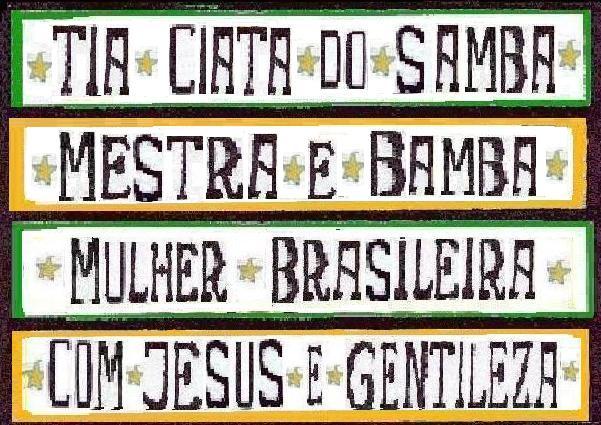
Tia Ciata (Hilaria Batista de Almeida, 1854-1924)
(Edited from her biography by Alvaro Neder)
Tia Ciata, aka Tia Assiata, was a woman from Bahia who had a fundamental role in the birth of Cariocan urban samba as a genre. She migrated to Rio from Bahia in 1875 and developed an informal cultural center at her home, where she would initiate the biggest composers and musicians of Rio de Janeiro of her time into the subtleties of samba from Bahia. As a result of this, in 1917, the first samba to be recorded, “Pelo Telefone,” was a collective composition done in her house, in which she herself participated, along with others.
During the day she would sell tidbits downtown, and at night she would reign in her home as an organizer of meetings for black townspeople. She was a leader in the Candomblé religion and would hold worship rituals for the orixas at her residence. It is important to note that, in that period, there were no public places for the poor or black inhabitants to socialize. So the meeting places of these segments of society were essentially family homes. Tia Ciata’s house became legendary because not only would she hold regular Candomblé sessions, but also because these sessions were followed by a samba, a kind of party where people could drink, eat, play, dance to music, meet and mingle, thus producing the birthplace of samba in Rio. In fact, as the sambas were persecuted by police, they were frequently disguised as religious activities. So, in these festive reunions, Tia Ciata’s house became widely known in Rio. Not only to black people, but also politicians, bohemians, musicians, and batuqueiros (percussionists) would gather there, attracted by her excellent culinary skills and the music. The parties could last for several days in a row, and people would spend the entire time there without returning to their homes until the feast was over.
The cultural exchange was the central focus in Tia Ciata’s house. Being a precursor of the migratory movements of blacks arriving from Bahia to Rio with the end of slavery (1888, five years after her arrival) and the massive demobilization, in 1897, of the troops of Baianos engaged in the fight against the fanatic religious leader Antônio Conselheiro, Tia Ciata was on the verge of a movement which would deeply influence the national culture via its ascendancy over the important capital, Rio de Janeiro. The most important composers and musicians of the time, like Caninha, Joao da Baiana, Donga, Pixinguinha, Sinhô, and Heitor dos Prazeres, along with less representative names like João da Mata, Mestre Germano, Minan, Didi da Gracinda, and João Câncio were regulars at her house. Disciples that continued her work were her son Eduardo da Tia Ciata, her granddaughters Lili da Tia Ciata and Tia Cincinha, her grandson Buci Moreira, Ministrinho da Cuíca, Dino, and Santa, among others. In that close interlacing of Baianos and Cariocas, Tia Ciata was one of the most influential tias (aunties) from Bahia, through her influential cultural center, that introduced the Cariocas to the culture from Bahia.







Leave a Reply